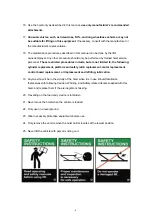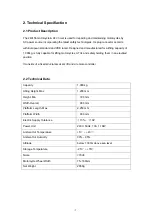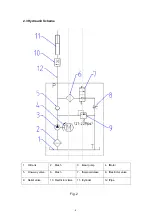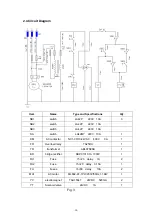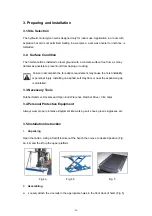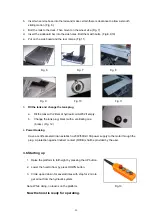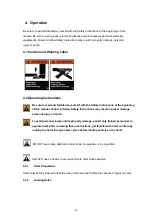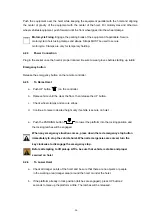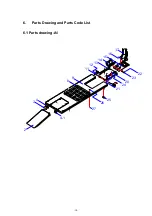
‐ ‐
4
1.3 Safety Instructions
1.
Do not
raise a vehicle on the
hoist
until the initialization is completed as described in this
manual.
2.
Technicians should be trained to use and care for the
hoist
by familiarizing themselves
with
the publications listed above. The
hoist
should
never be operated by an untrained
person.
3.
Always position the pads properly out of the way before pulling the vehicle into, or out of
the bay. Failure to do so could damage the vehicle and/or the
hoist
.
4.
Do not overload the
hoist
.
The capacity of the
hoist
is shown on cover of this document
and
on the lift’s serial number tag
5.
Positioning the vehicle is very important. Only trained technicians should position the
vehicle on the
hoist
.
Never allow anyone to stand in the path of the vehicle as it is
being
positioned and never raise vehicle with passengers inside.
6.
Position the pads to the vehicle manufacturer’s recommended pickup points. Raise the
hoist
until contact is made with the vehicle. Make sure that the pads and the ramps have
properly engaged the vehicle before raising the
hoist
to a working height.
7.
Keep everyone clear of the
hoist
when the
hoist
is moving, the locking mechanism is
disengaged, or the vehicle is in danger of falling.
8.
Unauthorized personnel should never be in the shop area when the
hoist
is in use.
9.
Inspect the
hoist
daily.
The
hoist
should never be operated if it has damaged
components,
or is malfunctioning.
Only qualified technicians should service the
hoist
.
Replace
damaged components with manufacturer’s parts, or equivalent.
10.
Keep the area around the
hoist
clear of obstacles.
11.
Never override the self-returning
hoist
controls.
12.
Avoid excessive rocking of the vehicle when it is on the
hoist
.
13.
To reduce the risk of personal injury, keep hair, loose clothing, fingers, and all body parts
away from moving parts.
14.
To reduce the risk of electric shock,
do not
use the
hoist
when wet, do not expose the
hoist
to
rain.
15.
To reduce the risk of fire,
do not
operate equipment in the vicinity of open containers of
flammable liquids (gasoline).





